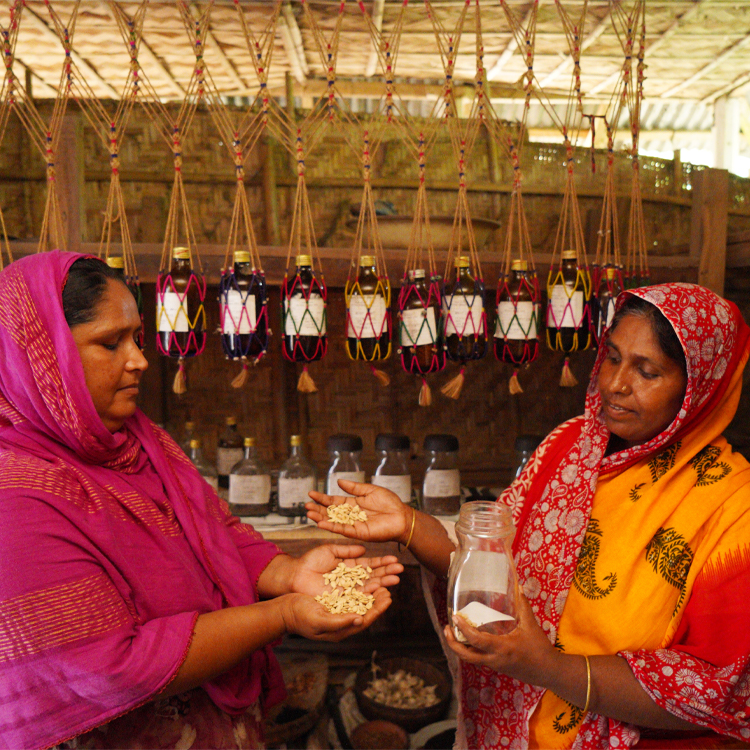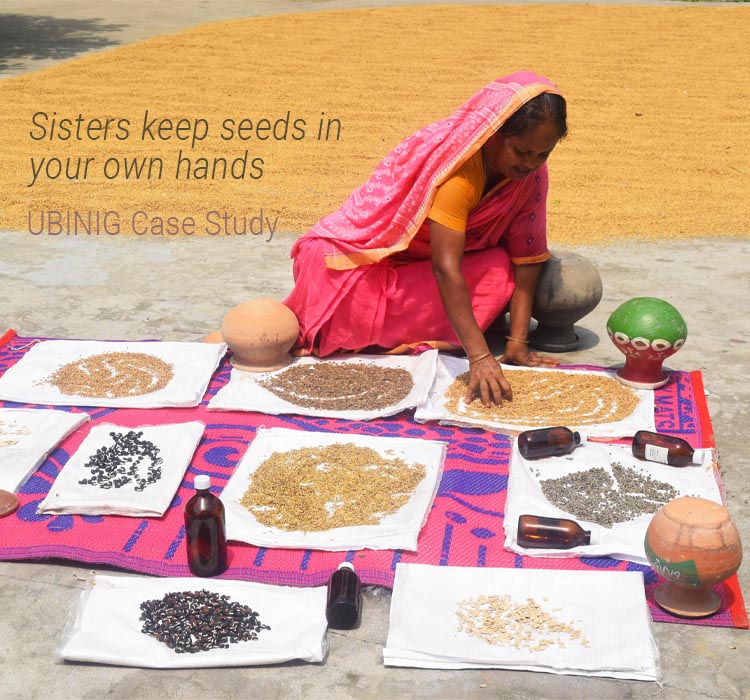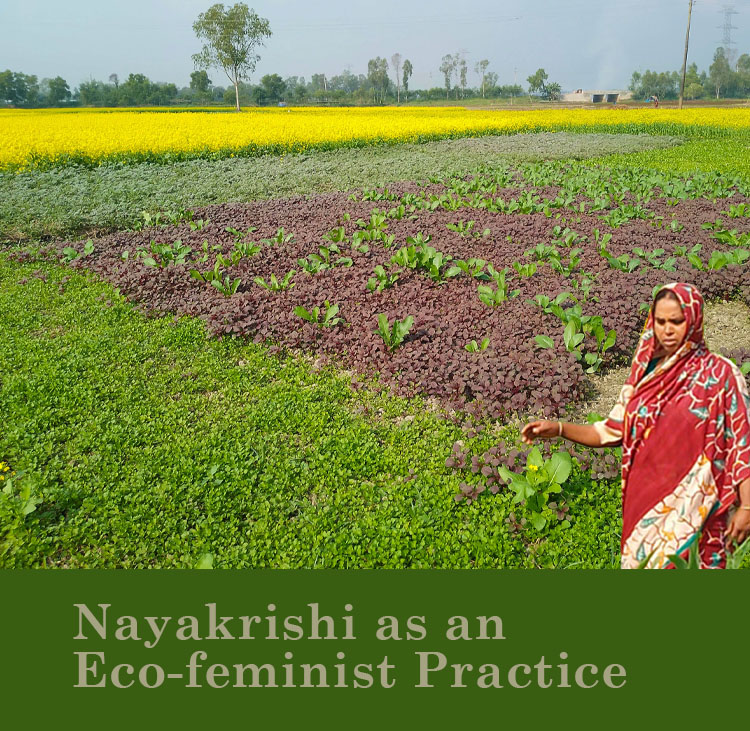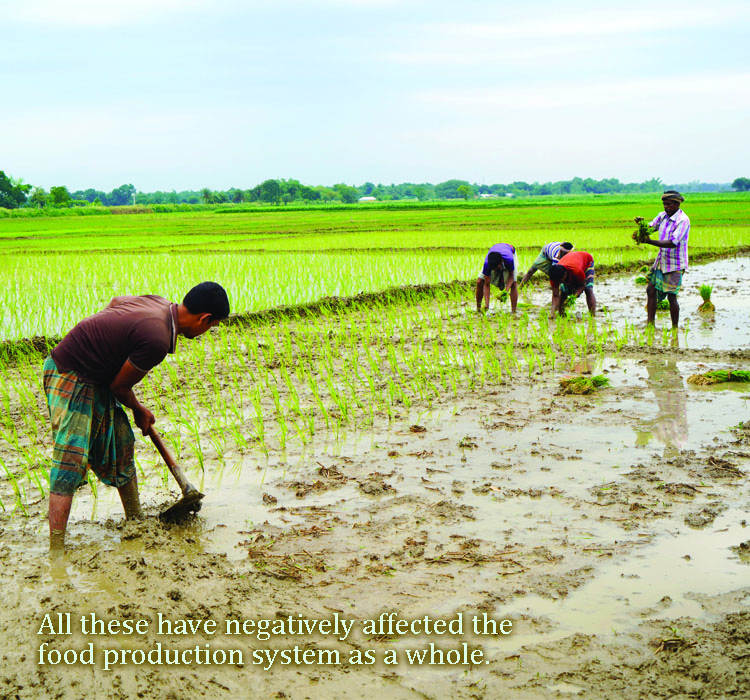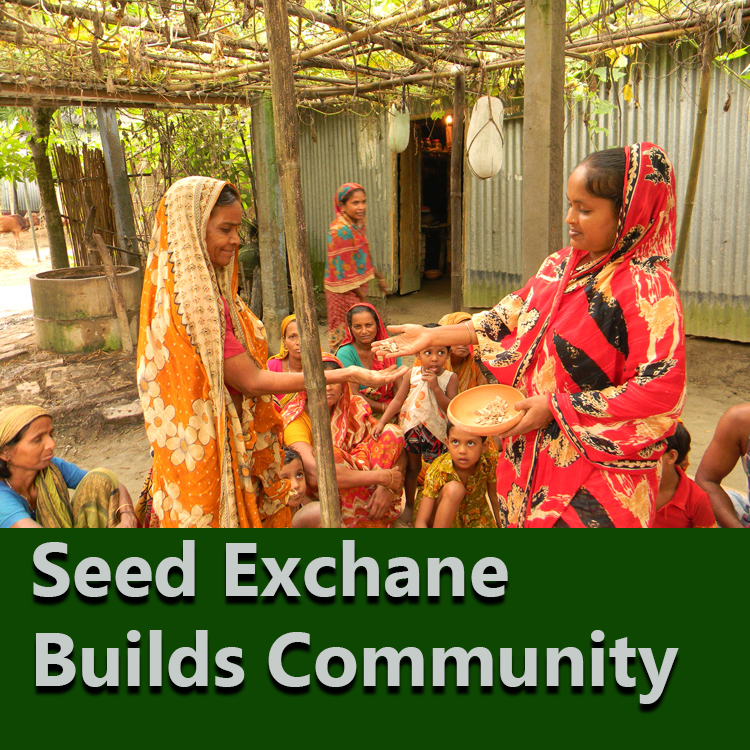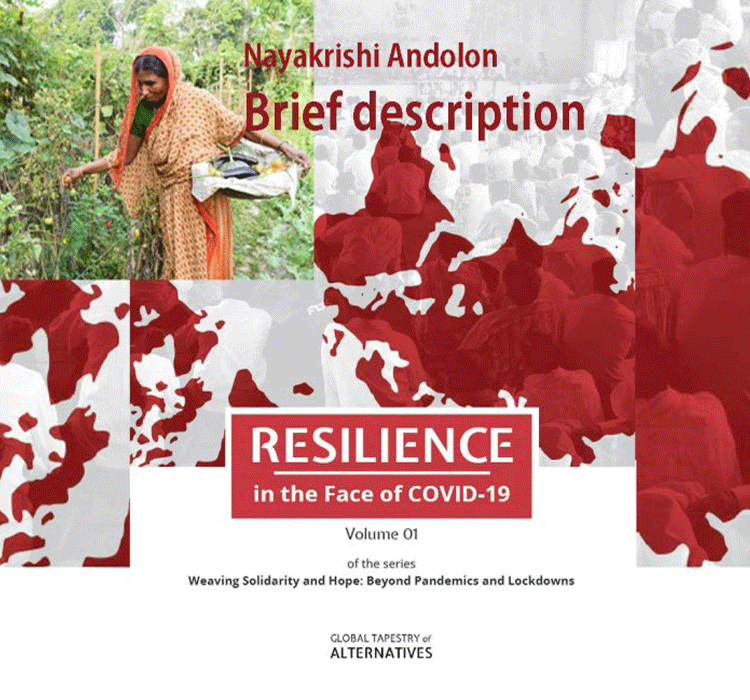Nayakrishi farmers’ Seed Collection and Conservation
Method of seed collection and conservation:
The Nayakrishi farmers always collect seed from matured fruits. Seeds are collected from selected plants. Selected plants are threshed separately for seeds. Extreme isolation and care is taken to avoid any undesired mixture. The seed is then cleaned properly. The clean seeds are sun dried for 3-4 days. The seeds are again cleaned after sun drying. The weak and unfilled grains are removed by winnowing. The seeds are then packed in containers/earthen pots/glass pots, depending on size, quantity and variety of seed and then stored. Vegetab (Read More)
Understanding Agro ecology: Learning and Sharing of Experiences
Nayakrishi learning and sharing of experiences event was organized by UBINIG in Ridoypur Biddaghor, Tangail during 19 to 21 January 2025. There were 21 participants including 12 women and 9 men from five agro ecology based organizations participated in the event. The participating organizations were Caritas Bangladesh (CB), Bangladesh Krishok Federation (BKF), Bangladesh Association for Sustainable Development (BASD), Bangladesh Environmental Lawyers Association (BELA), and UBINIG (Policy Research for Development Alternative). These five organizations has a platform known as “Bangladesh Agro ecology Platform (BAP). As lead organizati (Read More)
Soil Management in Nayakrishi Practicing
Soil management is an important aspect in Nayakrishi farming. Crop production planning is based on diversity and specialty of soil fertility management. Seeds of local varieties of crops, mixed cropping, intercropping and crop rotation are incorporated keeping adaptation in view to meet challenges of climate change variations. Soil fertility has been declining significantly with time since the introduction of modern agriculture in the name of green revolution with the increased use of pesticide, chemical fertilizer, and extraction of ground water for irrigation and use of mechanized implements for cultivation. At present, the amount of org (Read More)
Join with Nayakrishi
Discussion meeting for organizing Nayakrishi (Biodiversity based ecological agriculture) learning session was held involving 20 farmers at Habashpur village, Nandalalpur Union, Kumarkhali Upazila, Kushtia district. There were six farmers aged between 40-45 years. 12 were youths, two were disabled families and two farmers were share croppers.
In addition, there were two old Nayakrishi farmers those who were practicing Nayakrishi since introduction and were encouraging other farmers practicing Nayakrishi.
About the village:
The village is situated on the bank of the r (Read More)
Nayakrishi women gain command over seeds
“Sisters keep seeds in your own hands” is a powerful slogan of Nayakrishi farmers asserting the feminine role of seed keeping and regeneration of life. Nayakrishi Andolon, a movement of small-scale farmers practising biodiversity-based agriculture, is led mainly by women. Introducing the so-called ‘modern’ agriculture was a shift from the principle of biology and centrality of life to the deadly practice of chemicals, pesticides, and herbicides. Environmental destruction and ecocide are the results, along with shifts from quality to quantity of food production. The practice of the quantitative paradigm in agricultur (Read More)
Nayakrishi as an Eco-feminist Practice
Introduction
Nayakrishi, meaning ‘new agriculture, ' is a movement of small farming households in Bangladesh led by female farmers. The movement is critical for reducing food production into industrial fossil-fuel-based production systems driven by greed and denial of agriculture and rural lifestyle as a way of life. In the industrial paradigm of technology and production earth appears only as a source of raw materials and means of production and hardly the space where human beings share life with all life forms based on biodiverse relations and reciprocal dependence and/or caring. The characteristic feature of industrial civi (Read More)
Seed Sector of Bangladesh: Historical background and its effect in the present days
The historical background of the seed sector traced back to the British colonial period. Though at the initial stage, the British government was not interested in agriculture, however, this scenario started to change when the industrial revolution occurred in the 18th century and the global capital started to expand itself exponentially. To ensure the supply of the raw materials at a cheap rate for the industries established in their country, the British started to pay attention to the agriculture in colonial India. The British established an agricultural research institution named ‘Imperial Council of Agricultural Research’ an (Read More)
Nayakrishi farmers’ seed preservation, land rights, and women’s empowerment
Introduction
This action research report is based on UBINIG’s ongoing work with the Nayakrishi, a biodiversity-based farming practice led by small-scale farmers in two districts of Bangladesh.
In Tangail and Pabna UBINIG has been working with over 80,000 small-scale farming families. They are among approximately 300, 000 farming families UBINIG works with all over Bangladesh. Among 80,000 in Tangail and Pabna around 47,000 are women. Women are particularly involved in seed preservation and other related farming practices. These small farmers own less than a hectare of land each; families with no (Read More)
Nayakrishi Andolon: a pathway for just, equitable, and sustainable transitions and future in the global South
Introduction
The people of Bangladesh are ‘victims’ of the very predatory foundation of colonial-industrial civilization, based on fossil fuel. The country is a site of industrial extractive expansionism of exploitative global order. It is exceptionally vulnerable to climate change; and has been facing extreme weather with more and more frequent natural disasters like storms, cyclones, oceanic surges, drought, erosion, landslides, flooding, and salinization. These disasters are already displacing large numbers of people. Estimates show that by 2050, one in every seven people in Bangladesh will be displaced by climate cha (Read More)
Nayakrishi Andolon Geo-localisation: Bangladesh Brief description
Bangladesh’s farmers have struggled for decades to market their produce and earn a decent living. In the 1960’s, farmers were persuaded to adopt the Green Revolution model of agriculture. As a result, their livelihoods and other subsistence needs have been increasingly threatened (Mazhar et. al., 2001). In fact, the trade policies within the neoliberal globalised economic system continue to favour the industrial sector over the agricultural sector (Akhter, 2020).
Started in the early 1990’s, the Nayakrishi Andolon (New Agriculture Movement) has been building innovative farming prac (Read More)
Bangladesh: Community Seed Wealth Centers and stress-tolerant crop varieties
Brief history and functions of community seedbanks
In the late 1980’s, small-scale farmers practicing monoculture and chemical-based agriculture experienced loss of biodiversity and environmental degradation. The costs of production were rising beyond their capacity. In search for alternatives to chemical fertilizers and pesticides, farmers in the Tangail area of the country started Nayakrishi Andolon, a movement to support biodiversity-based ecological farming. The Tangail area was severely affected by the flood of 1988 causing severe loss of standing Aman crops (monsoon r (Read More)
